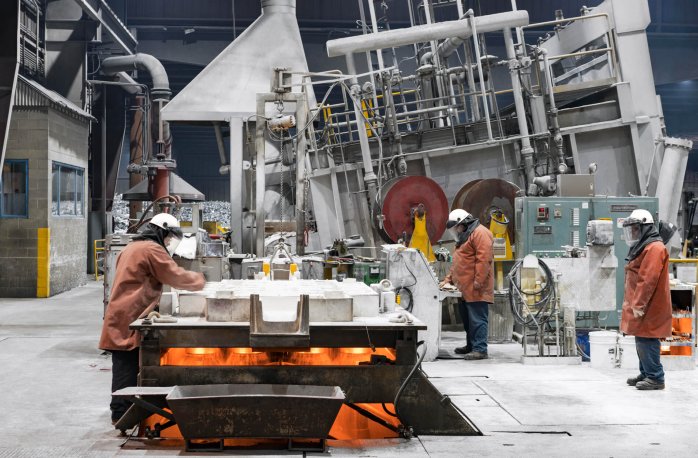

First wheels made entirely of secondary aluminum for the BMW Group
The goal is clear: by 2050, all wheels made by RONAL GROUP are to be completely CO2e neutral. The German plant in Landau is playing a pioneering role and is producing the first light-alloy wheels wholly made from secondary aluminum for the new, all-electric MINI Cooper SE Convertible.
Developing sustainable resources
RONAL GROUP has been working for years to develop sustainable resources and increase the proportion of recycled materials used in manufacturing to reduce its ecological footprint. By the middle of the year, RONAL GROUP’s production plant in Landau, Germany, plans to obtain approval from all OEM customers to use secondary aluminum. This could halve the plant’s CO2e footprint by the end of the year.
Working together with the car manufacturer MINI, RONAL GROUP has now produced the world’s first light-alloy wheels for a production vehicle wholly made from secondary aluminum. The wheels for the new MINI Cooper SE Convertible are made of 40% pre-consumer material and 60% post-consumer material. Pre-consumer scrap includes aluminum waste generated and processed in production before being returned to the smelting process, such as alu chips. These need to be washed and dried before they can be used again.
CO2e emissions cut by 90%
The post-consumer-aluminum is supplied by the company Eccomelt and is 100% recycled wheel scrap. The wheels are mechanically stripped, cleaned and crushed. It is crucial for us that the aluminum composition meets our specifications. This is the only way we can meet the requirements and ensure the safety of the component. As our Eccomelt material consists of the same alloy it is homogeneous in composition and has the same quality as primary aluminum. By using recycled materials, CO2e emissions from the aluminum materials can be reduced by over 90%, because in the case of Eccomelt aluminum, we only need to include preparation and transport to the plant in the figures. The energy consumed in the melting process is already taken into account in the CO2e calculations for production.
The Mini Electric Convertible wheel has an ecological footprint of around 31 kg CO2e. If the wheel were produced at today’s standards, i.e. from 60% primary aluminum, 40% pre-consumer material, and with green electricity in production – it would be at about 92 kg CO2e. Or 111 kg if you were to use the electricity mix commonly used in Europe instead of green electricity.
At the end of its life cycle, the MINI Cooper SE Convertible alloy wheel (without add-on parts) can be returned to the cycle and a new wheel created from it.
In the spirit of the circular economy
RONAL GROUP is also pursuing the concept of the circular economy – both in cooperation with its OEM customers and in the development of its own products for the aftermarket. “We brought the first CO2e-neutral wheel with recycled aluminum content to the market at the end of 2020, with the RONAL R70-blue”, says Martin Wyss, Project Manager (RONAL Aluminum Wheel Recycling). “It consists of a majority of pre-consumer and post-consumer material, as well as primary aluminum produced with renewable energies.” With the RONAL R70-blue, the unavoidable portion of CO2e emissions is offset with a Gold Standard certified project.
However, according to Wyss, the use of recycled material also brings challenges: “Partly because of the availability and quality on the market, and also because processing this material in production requires the melted mass to be cleaned very carefully.”
The project was started by RONAL GROUP in March 2021 with the aim of replacing as much of the primary aluminum used in wheel production as possible with recycled aluminum by 2030. "If we minimize the use of primary materials and replace them with equally high-quality recycled materials, we can conserve valuable resources," says Wyss. “We are demonstrating that this is possible within the spirit of the circular economy, with both our RONAL R70-blue and the wheels wholly made of secondary aluminum that we produce for the MINI Cooper SE Convertible.”
ASI certified at all plants
Producing primary aluminum is an energy-intensive process that impacts the environment. Procurement of primary aluminum accounts for the largest share of CO2 generated in RONAL GROUP's carbon footprint, at 74%. To reduce this, 65% of our primary aluminum is already produced using renewable energy. We purchase 100% of our aluminum from suppliers who are ASI (Aluminium Steward Initiative) certified or as least a member of this organization. Since September 2022, RONAL GROUP has been certified to ASI Performance Standard for all its cast wheel plants, with a focus on material stewardship.
As part of this certification, RONAL GROUP produced an environmental life-cycle assessment calculation for its plants, which was audited by TÜV Rheinland Energy GmbH. The results can be viewed on our website by clicking:
https://www.ronalgroup.com/en/sustainability/our-business/products/
These calculations form the basis for our CO2e calculations for the wheels. This brings us closer to our goal of identifying the environmental footprint of each wheel produced by RONAL GROUP.
RONAL GROUP Landau plant aluminum CO₂ footprint
| EU average | Current situation Landau | Special edition | |
|---|---|---|---|
|
Aluminum Primary Pre-consumer |
60% (EU mix) 40% |
60% (Landau mix) 40% |
60% (Eccomelt) 40% |
|
Energy Electricity Gas |
Normal EU mix Normal EU mix |
Renewable energy Normal EU mix |
Renewable energy Normal EU mix |
|
Result CO2 emissions |
111 kg CO2-eq |
92 kg CO2 |
30.7 kg CO2-eq |




